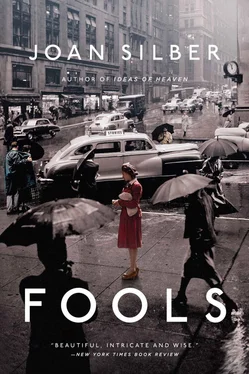A number of people pointed out that I wasn’t going to be young forever, but I was young for a really long time. Mick and I went hiking in the Grand Canyon, and another year we went snowshoeing in Utah, which turned out to be a handsome state. Mick, who’d once worked as what my mother called a “stevedore,” tended to like physical stuff. I liked it more than I expected, and for a while I even took ice-skating classes at a rink on a roof in midtown. You always surprise me , Ted wrote. I’m thinking of you in a little twirly skirt .
I wear slacks , I wrote.
Okinawa was subtropical and never got below fifty. Ted claimed to miss the snow but I didn’t believe him.
Well into my thirties, people thought I looked much younger. Ruthie’s kids called me Aunt LouLou, as if I were a cartoon auntie. They loved coming to my apartment — much bigger than the last, with blue-painted floors and Guernica replaced by a Matisse — but they could never believe I lived alone. No one else here, really? I wasn’t just making up a story?
What I didn’t like, actually, was when Mick showed up out of nowhere without letting me know in advance. “I have rules,” I said, but he ignored them. I was always glad for the sight of him, so I gave way, but it leaked out in other ways, my sense of injustice. We’d quarrel over how much hamburger to buy or which store was a rip-off or who was really a very self-centered person.
Once I had to announce to him that Ted, my husband, was showing up again in August. Ted only came back to the States every few years and he stayed with me when he did. It was, as they say, a given. And Mick had to know to keep away. How difficult was that?
“I think you’re telling me to go jump in the lake,” Mick said. “Very friendly.”
One remarkable thing about Ted was that he never seemed any different, no matter how much time went by. Oh, there was always a moment when I was surprised at how old he looked, and he’d start in about things I’d totally forgotten from his last visit, but we got used to each other at once. We’d hop into bed right away (the same bed, with the maple headboard), and then we’d lie around having a conversation we might have begun only the day before. He’d hold my hand and stroke my fingers. “Hey, Louise,” he’d say. “What’s up?” It was all very sentimental.
Ruthie was always asking me, “Does he just think he owns you?”
She knew I’d been brought up with much talk about property — property is theft, it’s the exploitation of the weak by the strong. “What you really mean,” I said, “is that I should exert my ownership rights on him . Reel him back in, make him mine.”
“You could.” Maybe.
“For freedom there is no substitute, there can be no substitute,” I said. It was an old quote from Rudolf Rocker, an anarcho-syndicalist my father loved. I didn’t think it was all that interesting or true — it was a slogan! — but it had become true for me. Or true sometimes. My mother would’ve cringed at that qualifier. I used to always tell my parents I was not an idealogue. “So what are you?” my mother would say.
“Not a hypocrite.”
“That’s minimal,” my mother said. “That’s not an answer.” But I thought it was. I liked how I’d turned out. Through trial and error.
When I was close to forty, I had a major quarrel with Mick, about the usual. He wanted me to fly out to see him in St. Louis for a four-day weekend. “I happen to be employed,” I said. “I can’t just take off.”
“I’m paying, darlin’,” he said. “It’s on me.”
“So? Please. Not the point.”
“You know what it is?” he said. “I’m the one you don’t take seriously.”
A man I saw five or six times a year was talking about serious?
“If your hubby wagged his finger to invite you to Japan, you’d hop on a plane and go.”
“I don’t want to go to Japan! I don’t!” I mostly didn’t, not anymore.
“St. Louis is a great town. Got the Arch, got the Cardinals. Only needs you.”
And I went for those four days, to placate him. St. Louis was fine, but right away he pestered me about staying an extra day, and I got indignant about the sneakiness of that. Why would I neglect my newsletter for him? It was not a good trip, and Mick started to call less often after that.
But Mick didn’t disappear altogether. In the middle of the night he’d need to talk to me, or I’d let him slip over when he was in town. So I wasn’t entirely single. My solitude had a flavor to it, a tint of distant admiration. It wasn’t bad getting those phone calls out of nowhere, kisses on the line. Then I’d stay up late, reading in bed, with his company in the air around me but a pure silence in the room. My room.
Ted was not really that old when he decided to sort of “retire” from his teaching career in Okinawa and set himself up over there as a private tutor of English. He could make a decent amount by the hour and he was looking forward, he said, to living in Japan in a different way. It was really not that expensive for an American to get by, and he would continue sending money home, but less money.
He didn’t exactly ask what I thought. Really, the amount he mailed had not changed much over the years and was by now pretty puny. My own salary had moved forward by the usual decent increments, so the change wouldn’t break me, would it? My mother was hotly outraged and would’ve sued him if she’d believed in governments. She actually said, “He owes you more.”
Ted was moving into the town and out of the gated and guarded base (which my mother always said sounded like a prison). I sent him a set of curtains for his new house, a very sharp geometric print I thought he would like. I didn’t entirely know what he liked anymore but I knew something.
Afterward I worried that I’d picked the wrong fabric. “You are so weird,” Ruthie said. “Go buy yourself a new sofa instead.”
We were on the phone at the time, and I looked around at my apartment. I liked everything in it, from the floor I had painted a clever shade of blue to the chrome lamp to the bowl of oranges glowing on the table. I was secretly enchanted with my own cruddy décor and its history. What did I need? Nothing wrong with my sofa, which had been in my parents’ living room. My stubborn dear parents. You don’t know what you’re going to be faithful to in this world, do you? It was true I didn’t have what other people had, I knew that, and yet I couldn’t think of a single other life I envied — no, I couldn’t — though I knew better than to try to get anyone to believe it.
Marcus kept thinking the memoir would make a great movie. He was reading a faded hardback, printed in 1952, with pages that cracked if you dog-eared them, but he couldn’t keep away from it. He was lying in a hammock in the yard of his friends’ house near Woodstock, and he had found the book on a living room shelf, where it had probably been for the last sixty years. The house had been in Casey’s family since forever.
The book was called Village Days and Nights and was about radicals and anarchists in Manhattan in the twenties and thirties arguing their brains out and fucking each other’s wives. The writing had hokey spots, but Marcus was into it. What a mix of poignant overconfidence (the revolution of the future! the inevitable death of capitalism! — not phrases you heard much in the twenty-first century) and truly sneaky hanky-panky. The author’s snarky wife was a great part for somebody.
Marcus agreed with most of what the author said — property was theft — but in the same way he believed that Jesus was God Incarnate, which he actually did believe, sort of. These ideas took up a separate sacred space in the mind. Living them out was a bloody mess, you could see from history. That was the problem, wasn’t it? He liked the book’s company and stayed with it for hours.
Читать дальше












